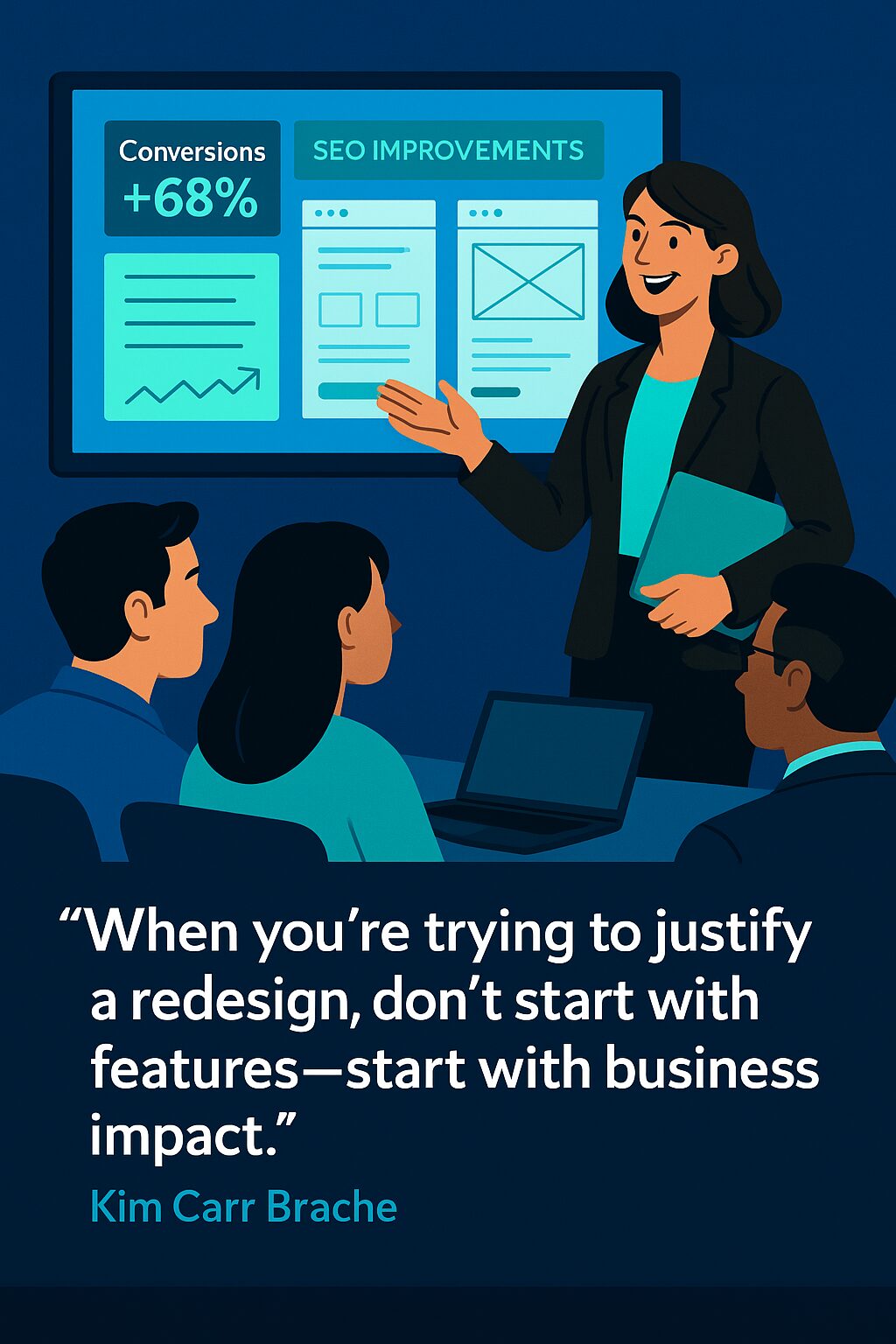TL;DR:
- Reframe the Redesign as a Revenue Enabler: Position the website redesign not merely as a visual update but as a strategic move to enhance lead generation, sales enablement, and operational efficiency.
- Highlight Current Website Limitations: Identify and communicate how the existing website hampers marketing efforts, be it through difficult content updates, poor user experience, or declining SEO performance.
- Estimate Potential ROI: Use data and benchmarks to project improvements in conversion rates, organic traffic, and time savings, demonstrating the tangible benefits of a redesign.
- Address Leadership Concerns Proactively: Anticipate objections related to budget, timing, or recent updates, and prepare counterarguments that emphasize long-term gains and alignment with current business goals.
- Provide a Clear, Low-Risk Proposal: Present a concise plan with a one-page pitch, sample timelines, and case studies to make the decision-making process straightforward for stakeholders.
You already know your company’s website isn’t doing your marketing team—or your buyers—any favors.
Maybe it’s slow, clunky, or impossible to update without an email to IT.
Maybe it’s not converting traffic into leads like it used to.
Or maybe it just looks… tired.
But recognizing the need for a website redesign is only half the battle. The harder part? Getting leadership to agree.
Here’s how to build a compelling business case that goes beyond aesthetics and proves that a website redesign is a smart, strategic investment—not just a nice-to-have.
Why Website Redesigns Get Pushed Off (Even When They’re Needed)
Let’s start with the elephant in the room: redesigns cost time, money, and trust. To your leadership team, they can sound like risky, non-essential projects.
As a mid-level marketing manager, you’re often stuck in the middle—understanding the urgency, but needing approval from execs who want hard numbers, not gut feelings.
The result? You wait. And stall. And duct-tape one more campaign onto an outdated platform.
What you need is a story they can believe in—one built on business impact.

Step 1: Shift the Conversation from “Redesign” to “Revenue Enablement”
Your leadership doesn’t care if the homepage looks modern or the menu is easier to use. They care about business outcomes.
So don’t just talk about web design and development. Talk about:
- Faster lead generation: A redesigned site can increase conversion rates by streamlining CTAs, improving load time, and aligning messaging with buyer intent.
- Better sales enablement: A modern site helps buyers self-qualify, access product info, and enter the sales pipeline more educated.
- Operational efficiency: A CMS that’s easy for marketers to use reduces dependence on dev teams and speeds campaign launches.
Make the redesign about removing friction—from marketing workflows to the buyer journey.
Step 2: Connect Website Pain Points to Daily Marketing Challenges
To build urgency, show how the current website is holding your team back.
Here’s a quick checklist you can use to pinpoint the friction:
- Are landing pages difficult to spin up?
- Does your team rely on developers for small content updates?
- Are campaigns underperforming due to clunky UX or broken CTAs?
- Is SEO visibility declining due to outdated structure or slow page speed?
- Are you unable to track conversions effectively?
When you connect technical issues to tangible marketing frustrations, you create a case leadership can feel—not just understand.
Step 3: Estimate the ROI of a Website Redesign
You don’t need to promise the moon. You just need to show potential.
Use available benchmarks, tools, and your own analytics to estimate the impact of redesigning your site.
Common ROI Drivers:
- Conversion Rate Lift
Example: Improving your form UX and page structure might increase conversions from 1.2% to 2.5%. - Increased Organic Traffic
A modern site with optimized structure and SEO strategy can raise your search visibility significantly over 6–12 months. - Time Saved
A CMS that empowers marketers can save 5–10+ hours/month currently spent waiting on IT or fixing bugs.
Frame your estimate like this:
“If we improve conversion rates by just 1%, that’s an additional 40–50 qualified leads per month—without increasing spend.”
Step 4: Anticipate and Address Leadership Concerns
Get ahead of common objections by proactively offering solutions.
| Objection | Your Response |
| “We don’t have the budget.” | “Here’s a scalable approach with phased delivery.” |
| “Now’s not the right time.” | “Delaying could cost us X in lost leads or hours per month.” |
| “We just updated the site a few years ago.” | “Buyer behavior and SEO standards have changed significantly since then.” |
Also, show how redesigning the site now sets your team up for success in key areas like conversion rate optimization, paid media management, and automation.
Step 5: Make the Path Forward Clear and Low-Risk
Don’t drop a 40-page presentation on your leadership team.
Give them a clear, simple next step:
- One-page pitch deck summarizing the ask
- Sample timeline or budget tiers
- Case study showing success from a similar company
- Soft call-to-action to scope the project with a trusted partner
How 3 Media Web Can Help
We work with marketers in B2B companies every day to turn website frustrations into real business momentum.
Our process blends strategic insight with practical execution, helping marketing managers like you:
- Justify the investment with data-backed reasoning
- Execute a full web design and development project without dragging your team down
- Build infrastructure that supports lead generation, SEO, and digital campaigns
- Maintain it all with proactive website support
